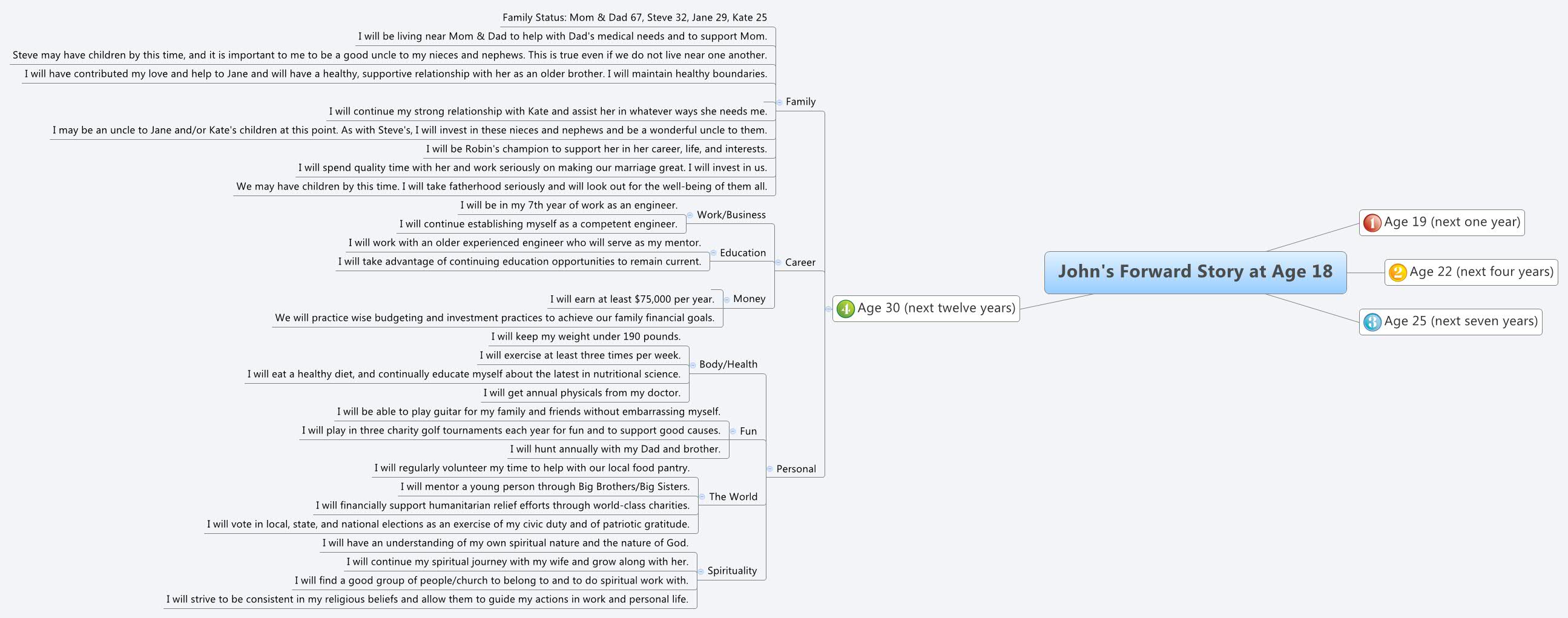This article is part of a series that began with “Using Mind Maps to Develop Your Forward Story.” We have used fictional 18 year-old John as an example and have started building his Forward Story by using the creative tool of mind mapping. In the last article we continued looking at John in twelve years when he will be thirty, and we focused on his career realm. He defined his career ambitions in light of his commitment to his family. As a reminder of where John is so far with his age thirty mind map, here is the map with those two realms completed. (All images will enlarge when clicked).
John has set some excellent goals for when he is thirty. The statements contained in each branch feel right to John. He gets excited thinking about it. The old saying goes: “All work and no play makes Jack a dull boy.” John wants to be a mature adult, but he also wants to have some fun. He does not want to be a dull boy. He wants to enjoy life and to live in a meaningful way. So the next realm he will think about is what we will call the Personal realm. We include in this realm body, health, fun, the world, and spirituality.
Body/Health
John knows that thirty is still young, but he wants to take care of his health so he will be able to handle all of the other goals he has already chosen for himself. If he gains a lot of weight, develops diabetes, and suffers from heart disease (like his father has), he may not be able to take care of his parents, siblings, nieces, nephews, or his wife. He has seen this happen to other friends and family members, so he is determined to make his health a priority. John writes the following statements:
- I will keep my weight under 190 pounds.
- I will exercise at least three times per week.
- I will eat a healthy diet, and continually educate myself about the latest in nutritional science.
- I will get annual physicals from my doctor.
For fun John really likes playing guitar. He is currently a novice, but would like to be much better in twelve years. He knows he can do it, so writes the following about guitar and other “fun” activities:
- I will be able to play guitar for my family and friends without embarrassing myself.
- I will play in three charity golf tournaments each year for fun and to support good causes.
- I will hunt annually with my Dad and brother.
Also in this personal realm, John needs to think about the larger world in which he lives. He is aware of people in other places and of his responsibility as a citizen of his own country. He writes:
- I will regularly volunteer my time to help with our local food pantry.
- I will mentor a young person through Big Brothers/Big Sisters.
- I will financially support humanitarian relief efforts through world-class charities.
- I will vote in local, state, and national elections as an exercise of my civic duty and of patriotic gratitude.
Finally, John will address spirituality. He is not quite certain where his spiritual life will take him, and he has a lot of questions. John considers himself a seeker after spiritual truth, so he has some expectations that by age thirty he may have found some answers to his questions. He contents himself with the following for now:
- I will have an understanding of my own spiritual nature and the nature of God.
- I will continue my spiritual journey with my wife and grow along with her.
- I will find a good group of people/church to belong to and to do spiritual work with.
- I will strive to be consistent in my religious beliefs and allow them to guide my actions in work and personal life.
Putting all of this together into his mind map, here is what John’s personal realm looks like at age thirty: 
John’s final mind map for age thirty is pretty busy. Here is what it looks like all put together:
This branch of John’s map represents a lot of hard work in thinking, visualizing, and writing. As good as this is, this is what John envisions his life looking like in twelve years. In order for this to be more than a fairly tale, he has a lot more work to do to bridge the gap between now and then. So, as a reminder, the thirty year branch is only a small part of John’s overall mind map. Here is a visual reminder of what is left to define:
In our next article we will look at the way John’s closer timeframes relate to this age thirty branch.








